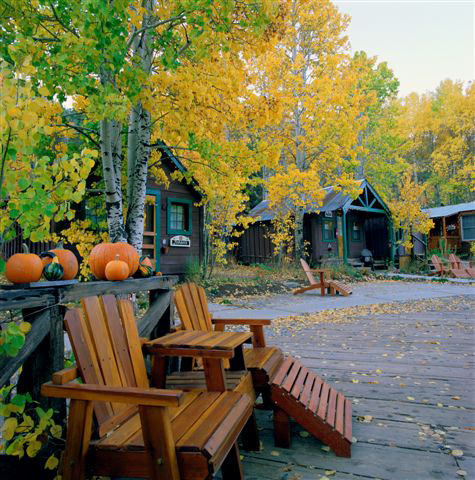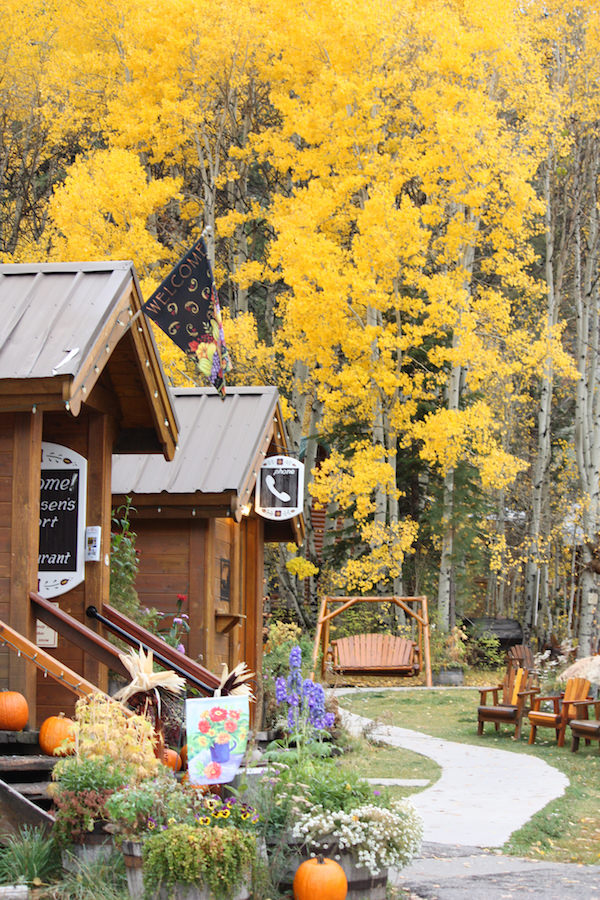“The magic of the landscape, the charming, eclectic collection of 32 cabins to stay in, and our wonderful food, the history dating back centuries, a long history of family involvement, and stringent environmental protection of the surrounding landscape … we’ve worked hard to preserve this unique place and offer our guests a special retreat from the everyday,” John says as he explains Sorensen’s Resort in a nutshell.
The late summer and fall months bring even more splendor to an already awe-inspiring setting. A brilliant show of aspen colors drapes the landscape as it readies itself for winter.
“This time of year is one of our favorites. Guests really enjoy the changing colors and many activities that celebrate the season. We’ve added some events open to the public that will bring even more splendor,” John adds.
As the weather cools and resort goers travel to Sorensen’s, the event lineup is as enchanting as the charming setting in which they will take place:

Lake Tahoe Paint and Sip Workshops
1 – 4 p.m., Sept. 29
$50 per person; includes a glass of wine, appetizers, and instruction.
Thanks to a collaboration with Lake Tahoe Paint and Sip, two exciting Paint and Sip Workshops are scheduled at Sorensen’s Resort this season. All ages and abilities are welcome, from kids to adults. An artist will walk participants step by step through a painting that makes for a memorable souvenir.
Summer Movie Nights by the Campfire
7:30 – 10 p.m., Sept. 13
Free; includes movie, popcorn, and hot cocoa.
Designed by one of the resort’s newest innkeepers, this free program includes family-friendly movies, popcorn, and complimentary hot cocoa. Sit among the aspen trees next to a crackling campfire while classic movies are projected on screen. S’mores, tea, beer, and wine will be available for sale at the events.
Mountain Girl Mysteries
7:30 – 8:30 p.m., Aug. 30 and Sept. 23
Free; includes readings by the author, complimentary cocoa, and cookies.
Enjoy a cozy night around the campfire as local Tahoe author Jennifer Quashnick reads from her Mountain Girl Mysteries series, which involves murder, mystery, and romance in the Sierra Nevada, including Hope Valley.
Historic Emigrant Trail Trek
8:30 a.m. – 3 p.m., Sept. 17
$65 Sorensen’s guests; $95 non-guests; $30 children age 6 – 13; includes snacks, beverages, and lunch.
Join historian Frank Tortorich as he returns to lead this popular area hike along the Old Emigrant Trail. Long and hard were the days of early emigrants, and participants will hear stories about their travels including sojourns in the lovely meadow on site. Discover more about the 1849 Gold Rush and the troubles over nearby Carson Pass, most notably the treacherous Devil’s Ladder.
For more information about these events and to reserve your spot, visit Sorensensresort.com.
Nevada Economic Development Conference highlights suburban neighborhood trend.
Courtesy of Nevada Economic Development Conference
Will community gardens supplant the clubhouse? Will fairway views fade into farmscapes, and the fast-rolling greens of the golf course become rows of kale, cabbage, and spinach?
In the late 1990s and early 2000s, new housing in Northern Nevada almost required that there be a golf course winding amid the homes.
But in recent years, many millennials, baby boomers, and retirees are seeking out neighborhoods that have more direct relationships to the land and to local food as urban landscapes turn into fresh-food deserts. An increasingly popular subdivision design called an agrihood is helping to fulfill this desire to connect more closely with community, nature, and our food supply.
The Fourth Annual Nevada Economic Development Conference set for Aug. 20-22, 2018 at the Atlantis Casino & Resort in Reno, and edible Reno-Tahoe magazine is a media sponsor for the event. This year’s conference will feature a presentation entitled Agrihoods 2.0 as part of its popular Agribusiness sessions. It will highlight the Corley Ranch in Douglas County as well as other agrihood developments that have sprung up around the United States.
Changes in the ’hood
Loosely defined by the Urban Land Institute as master-planned housing communities with working farms as their focus, many agrihoods offer ample green space, barns, outdoor kitchens, and farm-to-table restaurants.
Session speaker Jeff Birkby, who has managed sustainable agriculture and community development projects for nonprofit organizations and state and federal government agencies, says there is pent-up demand to develop food sources closer to our kitchen tables.
INSERT PHOTO: Birkbyphoto (*Can we put this photo small, to the left of the “Changes in the hood” first paragraph, as opposed to all by itself?)
CAPTION: Jeff Birkby
“We are beginning to see in-fill agrihoods that are turning blighted areas of cities, such as Detroit, into vibrant and desirable communities,” Birkby says. “This next phase of agrihood development looks to transform abandoned urban centers, using existing city property, instead of developing housing around pristine land outside of city limits.”
The Urban Land Institute estimates that, as of 2014, there were more than 200 agrihoods either developed or in the planning stages in the United States.
Agrihoods 2.0 session speaker Mark Neuffer, principal of Alta Consulting in San Jose, Calif., is developing Farmstead at Corley Ranch as one of those. Adjacent to what already is a working ranch, the proposed 250 homes will offer nearby amenities such as a community garden, greenhouse, and orchard.
INSERT PHOTO: mark-nueffer (Same placement as Birkby, to the left of the paragraph above)
CAPTION: Mark Nueffer
Neuffer, who has successfully developed numerous housing projects in the Sparks area, cites the Rancho Mission Viejo project in San Juan Capistrano, Calif., as a model for the Farmstead at Corley Ranch. There, residents have access to communal farms with orchards and workshop space, raised planters, in-ground crops, fruit trees, and community events featuring area farmers lending a hand in the communal gardens.
“I think this is a more meaningful housing product,” Neuffer says. “The golf course housing project doesn’t articulate what today’s home buyer is looking for.”
Plus, agrihoods offer developers a lower cost for amenities, Birkby says
“These costs, though significant, can be less than one-fifth of the costs of developing and maintaining a professionally designed golf course. And the consumer demand for housing in new agrihoods is tremendous,” he says.
Rancho Mission Viejo already is developing its second agrihood housing development, and agrihoods are popping up from Florida to Hawaii. In Davis, Calif., a 100-acre development called The Cannery is built around a working farm that will sell to local restaurants and grocers. The agrihood is built on the site of a former Hunt-Wesson tomato cannery — an excellent example of repurposing an industrial site, Birkby notes.
INSERT PHOTO: cannerydavis (size can be full, but not huge)
CAPTION: The Cannery in Davis is an operating agrihood
Agrihoods 2.0 also will feature Jack Jacobs, owner and manager of Jacobs Family Berry Farm. His recent Carson Valley agricultural activities have included 2018 Conservation Award for work to advance agriculture in Douglas County-Carson Valley.
INSERT PHOTO: Jack-Jacobs (*Note: Same placement and sizing as other head shots, please, next to the paragraph above)
CAPTION: Jack Jacobs
This trio will present the processes, challenges, and successes of the agrihood, as well as how the agrihood can benefit the entire community.
For details about this session and many other sessions on topics revealing the new Nevada economy, or to register, visit Nvedc.com.
Nevada Economic Development Conference
Tues., Aug. 21 and Wed., Aug. 22, 2018
Tracks include: Agribusiness, Economic Development, Manufacturing, Transportation/Infrastructure and Workforce Development.
The cost ($175 before July 6; $200 after July 6) includes opening sessions, lunch with keynote speakers, and exhibit hall reception. A one-day conference pass is $125 ($150 after July 6).
A pre-conference tour and workshop, Connecting Nevada to the Global Economy, on Aug. 20 will visit the SWITCH facility located at the Tahoe-Reno Industrial Center. A separate registration fee of $75 will be charged for this portion of the conference ($100 after July 6), which includes lunch and transportation.
This event is recognized by the International Economic Development Council as a professional development event that counts toward the recertification of Certified Economic Developers.


